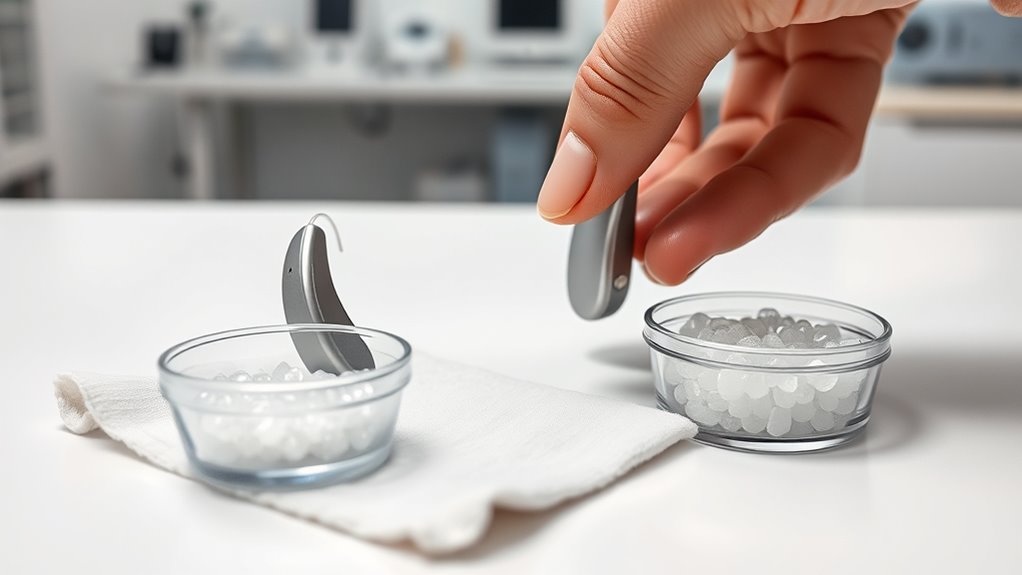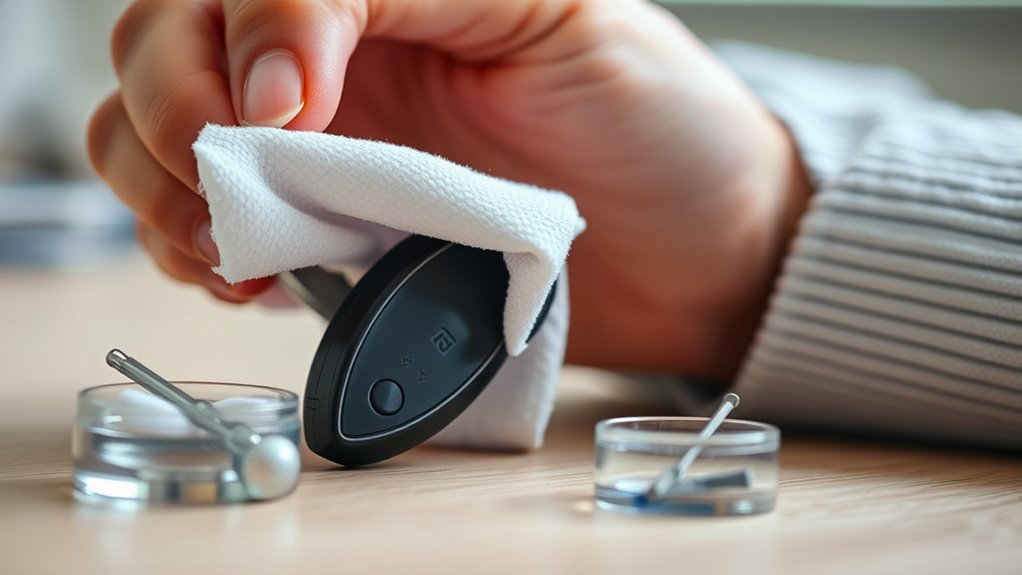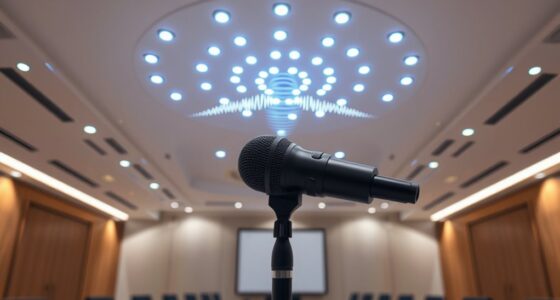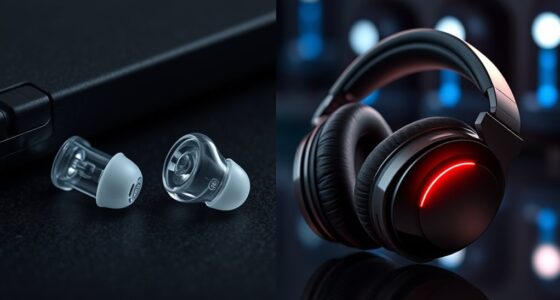To maintain your hearing devices, regularly clean them with a soft, dry cloth and gently clear any wax from small crevices. Remove batteries before cleaning, and avoid liquids on non-removable models. Dry your devices thoroughly using dehumidifiers or silica gel packs, and store them in a dry place away from heat. Check for debris or corrosion, and replace wax guards as needed. Continuing your upkeep routine helps guarantee your devices stay in top shape and perform smoothly.
Key Takeaways
- Remove batteries and wipe the device with a soft, dry cloth to prevent moisture buildup.
- Use specialized dryers or silica gel packets to thoroughly dry hearing devices after use.
- Regularly clean microphones, receivers, and wax guards to maintain sound quality and prevent blockages.
- Avoid liquids and direct heat exposure; clean sensitive parts gently with appropriate tools.
- Schedule professional cleanings periodically to ensure optimal performance and address hidden issues.

Properly cleaning and drying your hearing devices is essential for maintaining their performance and longevity. Neglecting this step can lead to decreased sound quality, shortened battery life, and even device failure. To keep your hearing aids functioning at their best, you need to develop a routine that includes regular cleaning and drying. When it comes to battery life, dirt, earwax, and moisture are the main culprits that drain power faster. Cleaning your devices regularly helps ensure the batteries last longer and perform better throughout the day.
Proper cleaning and drying extend hearing device life and improve performance.
Start by removing the batteries if your hearing aids have removable ones. Use a soft, dry cloth to gently wipe the exterior, paying close attention to small crevices where dirt and wax tend to accumulate. For models with non-removable batteries, avoid using liquids directly on the device. Instead, use a brush or a dry cloth to remove debris. Be cautious not to push wax further into the device, as this can affect sound quality and cause troubleshooting issues down the line. If your hearing aids have a wax guard or filter, check it regularly and replace it if it’s clogged or damaged to prevent sound muffling and improve battery efficiency.
Drying is equally important. Moisture from sweat or humid environments can cause corrosion and damage internal components. To prevent this, use a specialized hearing aid dryer or dehumidifier designed for electronic devices. These devices pull moisture out of the hearing aids, extending their life and ensuring excellent performance. If you don’t have a commercial dryer, you can use silica gel packets or a soft cloth to absorb excess moisture. Avoid exposing your hearing aids to direct heat or sunlight, as extreme temperatures can warp or damage sensitive parts. Additionally, understanding device maintenance can help you identify issues early and prolong the lifespan of your hearing aids.
Troubleshooting tips are helpful if your hearing aids aren’t performing well even after cleaning. Check the battery compartment for corrosion or debris, and replace batteries if they’re old or weak. Sometimes, a simple restart or resetting the device can resolve issues like static or feedback. If you notice reduced sound quality, inspect the microphone and receiver for blockages, and clean them gently. Regularly scheduling professional cleanings can also prevent common problems and keep your devices in top shape.
Frequently Asked Questions
How Often Should I Replace My Hearing Device Batteries?
You should replace your hearing device batteries every 3 to 7 days, depending on their battery lifespan and usage. Keep an eye on the battery indicator; when it dims or turns off, it’s time for a replacement. Establish a routine replacement schedule to guarantee your device functions at its best. Carry spare batteries with you, especially when you’re out, to avoid interruptions and maintain clear hearing.
Can I Use Alcohol-Based Cleaners on My Hearing Aids?
Sure, go ahead and splash alcohol-based cleaners on your hearing aids—if you enjoy risking damage and voiding warranties. But seriously, alcohol safety is vital; these cleaning solutions can harm delicate components. Instead, stick to manufacturer-approved cleaning products designed specifically for hearing devices. Your hearing aids will thank you with better performance and longer life, and you won’t have to replace them after a reckless cleaning spree.
What Should I Do if My Hearing Device Gets Water Damage?
If your hearing device gets water damage, act quickly. Remove it from your ear and turn it off immediately. Gently dry the device with a soft cloth and avoid using heat or direct sunlight. Use a device drying kit or silica gel packets if available, as they help absorb moisture. Do not shake or attempt to dry it with a hairdryer. Proper device drying minimizes water damage and helps preserve your hearing aid.
Are There Specific Drying Products Recommended for Hearing Aids?
Your hearing aids deserve the best, and yes, some drying products are highly recommended for ideal hearing aid maintenance. Look for silica gel packs or specialized electronic drying devices designed specifically for hearing aids. These products efficiently remove moisture and keep your devices in top shape. Avoid using regular rice or household items, as they can damage delicate components. Proper drying products help extend your hearing aids’ lifespan and ensure clear, crisp sound.
How Can I Prevent Earwax Buildup in My Hearing Devices?
To prevent earwax buildup in your hearing devices, you should regularly perform earwax removal and maintain proper hearing aid care. Clean your devices daily with a soft, dry cloth and use a wax guard or filter as recommended. Avoid inserting objects into your ears, and schedule routine check-ups with your audiologist. Consistent hearing aid maintenance keeps your devices functioning well and helps prevent wax-related issues.
Conclusion
Taking care of your hearing devices by regularly cleaning and drying them can extend their lifespan and improve performance. Did you know that improper maintenance can reduce a hearing aid’s lifespan by up to 30%? So, make it a habit to clean daily and dry thoroughly. Your devices will thank you, and you’ll enjoy clearer sound and better hearing. Proper care isn’t just routine—it’s essential for keeping your hearing devices working like new.










